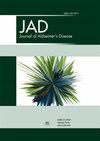昼夜节律在与脑血管疾病相关的血脑屏障功能障碍中的新作用
IF 3.4
3区 医学
Q2 NEUROSCIENCES
Journal of Alzheimer's Disease
Pub Date : 2025-07-01
Epub Date: 2025-05-04
DOI:10.1177/13872877251337775
引用次数: 0
摘要
昼夜节律与脑血管疾病之间的关系最近成为一个令人着迷的研究领域。研究发现昼夜节律可影响脑血管病(CSVD)的发生和恶化。血脑屏障(BBB)功能障碍是心血管疾病发生机制的关键因素之一。这被认为是由生物钟基因的昼夜振荡调节的,生物钟基因控制转运体功能,调节血脑屏障内皮细胞、紧密连接蛋白和周细胞的通透性。了解昼夜节律基因和血脑屏障成分之间的相互作用可能有助于开发有希望的心血管疾病治疗方法。本文章由计算机程序翻译,如有差异,请以英文原文为准。
The emerging role of the circadian rhythm in the blood-brain barrier dysfunction associated with cerebral small vessel disease.
The relationship between circadian rhythm and cerebrovascular disease has recently emerged as a fascinating area of research. It has been found that the circadian rhythm could affect the development and exacerbation of cerebral small vessel disease (CSVD). Dysfunction of the blood-brain barrier (BBB) is one of the key players in the mechanisms of CSVD. This is thought to be regulated by circadian oscillations of clock genes, which control transporter function, regulating the permeability of the BBB endothelial cells, tight junction proteins, and pericytes. Understanding the interaction between circadian genes and BBB components may contribute to the development of promising treatments for CSVD.
求助全文
通过发布文献求助,成功后即可免费获取论文全文。
去求助
来源期刊

Journal of Alzheimer's Disease
医学-神经科学
CiteScore
6.40
自引率
7.50%
发文量
1327
审稿时长
2 months
期刊介绍:
The Journal of Alzheimer''s Disease (JAD) is an international multidisciplinary journal to facilitate progress in understanding the etiology, pathogenesis, epidemiology, genetics, behavior, treatment and psychology of Alzheimer''s disease. The journal publishes research reports, reviews, short communications, hypotheses, ethics reviews, book reviews, and letters-to-the-editor. The journal is dedicated to providing an open forum for original research that will expedite our fundamental understanding of Alzheimer''s disease.
 求助内容:
求助内容: 应助结果提醒方式:
应助结果提醒方式:


